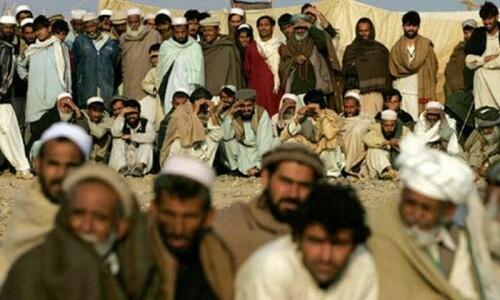WASHINGTON: US-Pakistan relations hit a new low in 2017 and a series of high-level contacts between the two countries exposed the weakness in this relationship instead of strengthening it.
It was also during 2017 that the US administration announced a new strategy for winning the war in Afghanistan, urging Pakistan to join the US-led efforts to defeat the Taliban in the battlefield. The policy recognises Pakistan’s right to reject the US offer but warns that there will be consequences if it decides to do so.
In statements, President Donald Trump, his vice president, secretaries of defence and state and national security advisers and other senior officials highlighted the consequences that the policy hints at — from stopping US economic and military assistance to raising doubts about Pakistan’s ability to provide “responsible stewardship” to its nuclear assets.
Some officials warned that Pakistan could “lose territory” if it did not eradicate terrorist safe havens from its soil. Others said the US could take “unilateral action” in areas of divergence with Pakistan.
The statements, along with the pronouncement that India now is the strongest US ally, alarmed Pakistan, forcing it to look for other options to protect its interests.
Initially, Pakistan reacted cautiously to these threats, but on Thursday, military’s chief spokesman Maj Gen Asif Ghafoor told the United States and Afghanistan that it’s time for them to do more for Pakistan, instead of asking Islamabad to do so.
“No organised infrastructure of any banned organisation is present in Pakistan. We have fought an imposed and imported war twice in Pakistan and now we cannot do any more for anyone,” he said.
But the same day, US Secretary of State Rex Tillerson offered to partner with Pakistan against terrorism, indicating that the Trump administration still hopes to persuade Islamabad to accept its demands despite the recent bitterness.
The Pakistani establishment’s strong reaction to these demands followed a warning from Vice President Mike Pence that President “Trump has put Pakistan on notice,” and that “Pakistan has much to gain from partnering with the United States, and … much to lose by continuing to harbour criminals and terrorists”.
High-level visits
The warnings and high-level visits to Pakistan started in August. In the last four months, half a dozen US officials have visited Islamabad to persuade Pakistan to support the new US policy, including Secretary of State Rex Tillerson, Secretary of Defence James Mattis, Centcom chief Gen Joseph Votel and Trump South Asia adviser Lisa Curtis and Assistant Secretary of State Alice G. Wells.
The visitors met all key Pakistani leaders — including Prime Minister Shahid Khaqan Abbasi, Army Chief Gen Qamar Javed Bajwa, and ISI chief Let Gen Naveed Mukhtar.
But the only positive comment that came out of such contacts was the expression of a desire to continue working for “a common ground”.
Mr Tillerson said after his October visit he told Pakistani leadership that Washington would implement its new strategy with or without their support. “And if you don’t want to do that, don’t feel you can do it, we’ll adjust our tactics and our strategies to achieve the same objective a different way”.
The next visitor was Secretary Mattis who repeated a frequent US call on Pakistan to do more after a meeting with Pakistani leaders early this month.
This lack of progress in these contacts shows differences between Islamabad and Washington over the new US strategy which claims that Pakistan “often gives safe haven to agents of chaos, violence, and terror”.
While announcing the new strategy, President Trump also said that the US has been “paying Pakistan billions and billions of dollars at the same time they are housing the very terrorists that we are fighting” but this must stop now.
Pakistan says that US leaders continue to repeat a false claim – that Islamabad shelters terrorists – and reminds them that friends “do not put each other on notice.”
Michael Kugelman, deputy director for South Asia at the US-based Wilson Centre, says he does not believe such threats could change Pakistan’s response to the US demand in the near future.
“From a Pakistani perspective, it makes perfect sense to have the
Afghan Taliban in their corner,” said Kugelman. “Pakistan, just like everyone else in the region, assumes that eventually, US troops will withdraw from Afghanistan,” he told Al Jazeera.
When that withdrawal happens, Mr Kugelman added, there was a risk of “rampant destabilisation and civil war in Afghanistan”, and a relationship with the Afghan Taliban would be valuable for Pakistan in that context.
Published in Dawn, December 30th, 2017















































